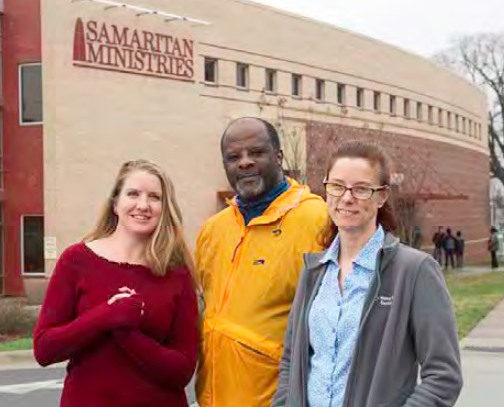Groups Develop Winning Formula for Working with Vulnerable Populations
By Les Gura
Most don’t see the most vulnerable people in the community or they choose to look away when they walk right past on the street. But two organizations in Winston-Salem are right there with these homeless folks, seeking them out in abandoned warehouses, hiding behind highway bridges or living in the woods.
Their goal? Have a conversation. And slowly, ever so slowly, build their trust so they might have a better chance to survive — with food, access to care, maybe even a place off the street.
Obie Johnson’s personal experiences give him a particular empathy in his job as team lead for The Empowerment Project, a nonprofit whose small staff works with the hardcore homeless — people on the street who often have two or more simultaneous diseases or conditions such as addiction, mental illness or physical illness. (Johnson pictured in center, with Bree Fergusson at left and Elizabeth Blake.) Many have been banned from homeless shelters or cannot cope with the rules and boundaries set within a shelter.
Meet them where they are
Johnson understands his clients; he has 30 years of sobriety after he went through years of addiction and depression as a young man.
 Assistance for those who are homeless, and who may have addiction or mental health problems, is not always obvious, Johnson says.
Assistance for those who are homeless, and who may have addiction or mental health problems, is not always obvious, Johnson says.
“A person living in the woods could probably be best served if he had a place to stay, but if that person, at that moment of contact, is not ready for housing but would prefer a sandwich and some socks, then that’s what we do,” he says. “We meet them right where they are.”
Many of more than 200 people reached by The Empowerment Project in 2017 came directly from staff members heading out into those hidden places of Winston-Salem. Johnson says it is all part of the effort to have a conversation.
“We build relationships. We want to help them, but not to dictate to them or tell them what’s best,” he says.
Homeless people often are leery of authorities, Johnson says, so trust is built by talking and bringing people little things they need.
Over time, he says, his staff can help some clients understand what they want and begin to advocate for them. That might mean helping them receive assistance for physical or mental health care, food, housing or even employment.
Partnering to reach people
The Empowerment Project was created four years ago as a newer version of a federal program that began in the 1980s and targeted homeless people with a history of severe and persistent mental illness.
 In its new incarnation, The Empowerment Project partners with Wake Forest Baptist Health’s Division of FaithHealth and has a broader ability to reach people with chronic substance abuse problems. The program is housed within Samaritan Ministries on Northwest Boulevard in Winston-Salem, which gives team members immediate access to those who eat at Samaritan’s soup kitchen or stay at its shelter.
In its new incarnation, The Empowerment Project partners with Wake Forest Baptist Health’s Division of FaithHealth and has a broader ability to reach people with chronic substance abuse problems. The program is housed within Samaritan Ministries on Northwest Boulevard in Winston-Salem, which gives team members immediate access to those who eat at Samaritan’s soup kitchen or stay at its shelter.
City with Dwellings
Staff members with The Empowerment Project frequently work with another Winston-Salem nonprofit organization, City with Dwellings. Lea Thullbery, case coordinator with City with Dwellings, says the organization got its start in late 2013 to provide overflow beds for existing homeless shelters that were full.
With churches stepping in to offer space and a strong team of volunteers pitching in, arrangements have been made each year since to handle overflow shelter housing from Dec. 1 through March 31, as many as 90 beds.
Beyond shelter, though, the City with Dwellings team has engaged in finding people, similar to The Empowerment Project, including both beds and other assistance.
 Thullbery says hospitals and treatment centers often call City with Dwellings when a patient or client is being discharged and does not have family or friends to take them in or provide a place to stay. City with Dwellings works to place all of its referrals, even if a person is struggling with dependency or addiction.
Thullbery says hospitals and treatment centers often call City with Dwellings when a patient or client is being discharged and does not have family or friends to take them in or provide a place to stay. City with Dwellings works to place all of its referrals, even if a person is struggling with dependency or addiction.
“Hundreds of people now in Winston-Salem experiencing homelessness consider us trustworthy,” Thullbery says. “We’re the only low-barrier shelter in town.”
City with Dwelling team members not only exchange referrals and information with The Empowerment Project, but also work closely with the FaithHealth team at Wake Forest Baptist to begin connecting discharge patients with other services.
A day center: just to talk
Starting in February 2017, City with Dwellings also opened a two-day-a-week (Tuesdays and Thursdays) day center, open from 9 to 11 a.m. year-round at 633 W. 3rd Street in Winston-Salem. The day center is open to all just to talk with volunteers or team members. In addition, clients can have a free cup of coffee, access resources, or take art therapy, yoga or tai chi classes.
Thullbery says even though the overflow shelters are only open four months a year, the number of visitors to the day center has remained steady year-round at about 40 per session.
Although the overall number of people seen by City with Dwellings declined from 450 in its first year to under 300 in 2016-17, this year’s numbers are well on their way over 400 again. Thullbery says that points out the importance of the work of her organization and The Empowerment Project.
“We don’t want to be an overflow shelter. We’d love to be able to close our doors,” she says. “But we are making a difference, and not just with our clients.”
 Volunteers get to know the people on the street
Volunteers get to know the people on the street
Thullbery notes the organization has 500 volunteers each overflow shelter season, and those who volunteer get to meet, talk and know the men and women who are homeless.
“Half of what City with Dwellings does is try to transform not so much the heart but the minds of our housed neighbors to know that this issue exists in our city,” she says. “My favorite thing to hear from a volunteer is when they meet someone they have helped on the street and have a conversation with them, and introduce them to their spouse.
“These are people with challenges, but they are deserving of a smile just like everyone else.”
Teresa Cutts, an assistant professor of social sciences and health policy with Wake Forest Baptist, is director with The Empowerment Project and a member of the City with Dwellings’ board. She says the accomplishments of the two agencies are critical in that they reach the most vulnerable people in our society when no one else will.
“They know the life of people on the street,” she says. “These programs fill a niche that other programs don’t.”
Related post:

